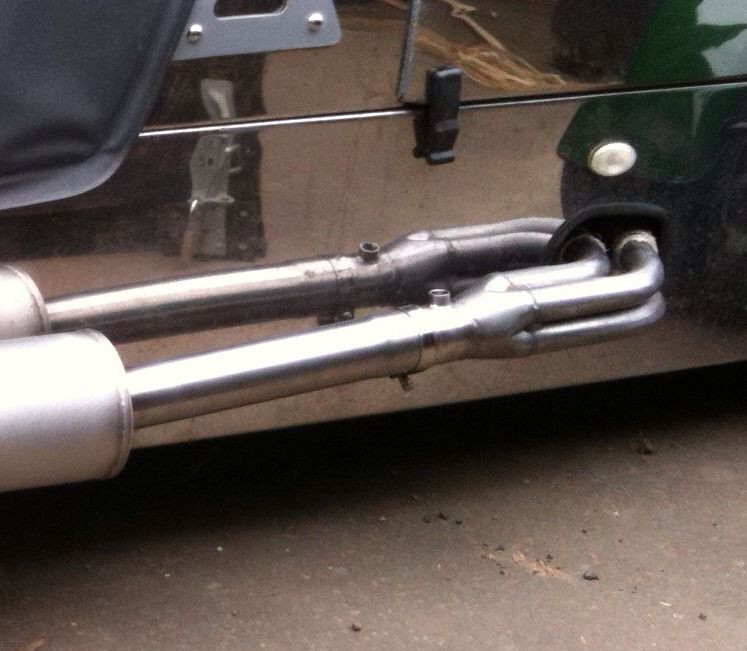craig_thomas
|
| posted on 2/2/16 at 06:15 PM |

|
|
Lambda sensor location
Where's the best place to put a o2 sensor? Pics welcome.
|
|
|
|
|
snapper
|
| posted on 2/2/16 at 06:29 PM |

|
|
Behind the 4 into 1 collector further back the better for mixing
However many bolt it straight into the collector without issue.

I eat to survive
I drink to forget
I breath to pi55 my ex wife off (and now my ex partner)
|
|
|
britishtrident
|
| posted on 2/2/16 at 06:54 PM |

|
|
Oxygen sensors need lots of heat to work quickly after a cold start. --- for upstream sensors that means as close to the engine as possible at a
point exposed equally to gas flow from all cylinders in the bank it monitors.
[I] “ What use our work, Bennet, if we cannot care for those we love? .”
― From BBC TV/Amazon's Ripper Street.
[/I]
|
|
|
obfripper
|
| posted on 2/2/16 at 09:48 PM |

|
|
Try to make sure the sensor is between the 10 and 2 o clock positions (as close to vertical is ideal), otherwise when the engine is cold condensation
can get into the heated ceramic part of the sensor and cause it to crack and fail.
Ensure the heater circuit is powered all the time the engine is running, this will help stop carbon fouling of the sensor and stop condensation
forming inside the sensor thimble cover.
If you are going to use a wideband sensor, they are sensitive to extremes of heat and may need spacing away or a heatsink with
turbo/supercharged/highly tuned engines to maintain accuracy and prevent heat damage, conversely on cruise the air cooling on the sensor can exceed
the output of the heater circuit and cause cold sensor errors and no reading with faster sensor fouling - the sensor datasheet will give an ideal
operating temp range.
If you are running a catalyst the sensor will need to be pre cat, a post cat sensor is only useful for checking the function of the cat, not for
tuning applications.
Placing the sensor too far down the system can also run the risk of sensing o2 being drawn in by the exhaust pulses giving false lean readings.
Dave
|
|
|
Mikef
|
| posted on 3/2/16 at 09:09 AM |

|
|
As above, have mine after the last branch and before the cat.
|
|
|
coyoteboy
|
| posted on 3/2/16 at 01:15 PM |

|
|
Old-school sensors (4wire and less) want to be as close as possible to the ports in the fully combined flow. Wideband want to be carefully placed a
bit further away (1-2m). If you'#re tuning from it you want to minimise the distance to minimise lag, it's all a trade-off.
|
|
|
Oddified
|
| posted on 3/2/16 at 09:41 PM |

|
|
As mentioned above, a wideband on a higher tuned engine (turbo/supercharger/nitrous) need to be a bit further down stream than at the collector or
they cook. I went through quite a few until i moved it a further 3 foot along to just before the 1st silencer, been fine for a few years now 
Ian
|
|
|
coyoteboy
|
| posted on 4/2/16 at 09:26 AM |

|
|
Yeah mine is about ~1m from the turbo and it craps out if I'm getting heavy right footed for extended periods.
|
|
|
SteveWallace
|
| posted on 4/2/16 at 09:43 AM |

|
|
If you need to go through IVA and its going to be outside of the engine bay, the other thing to consider is the radius requirements. If you can place
it where the test sphere cannot touch it then it saves the bother of having to put some form of cover on the nut, which can be quite tricky as
obviously rubber is no good for the temperatures it gets to.
Its a bit daft that they worry about the edges on a hex nut when the biggest risk from touching it is being burnt, but them's the rules!
|
|
|













